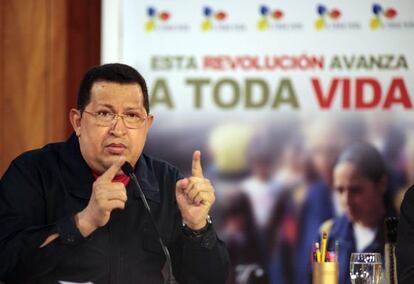Venezuela televises the revolution in 40 episodes
President Chávez imparts his political vision in new soap opera ‘Teresa en tres estaciones’

A series of old photographs appears on the TV screen and in the background, the deep voice of an announcer is heard: “There once was a country that had a railroad, but petroleum turned it into a memory... not even a rusty train covered that route, until one day...”
The sound of conga drums and trumpets fades in and a computer-animated box train appears, connecting the Venezuelan capital of Caracas with the satellite city of Valles del Tuy. The rail link is one of “the masterpieces of the revolution” of which President Hugo Chávez is most proud and one that “changes the lives” of the three women who star in Teresa en tres estaciones (or, Teresa in three stations), a new telenovela that began airing last week on one of the government’s seven state-run channels.
The main character, María Teresa, is described as “a 48-year-old regal woman, the chief conductor of the railway system in Valles del Tuy” who later in the soap opera, will meet “her first love” in between the train cars.
The supporting character, 28-year-old Teresa Cruz, is a single mother and Venezuelan folk singer who works at a hair salon located on the last stop of the train route.
Finally, there’s Ana Teresa Landaeta, an 18-year-old girl who comes from the provinces to Caracas to study film directing at the National Experimental University of the Arts, which was created by Chávez in 2008.
Their stories cover 40 half-hour episodes broadcast Monday to Friday on Venezuelan Social Television (TVES), the public channel that operates on the frequency that once belonged to private network Radio-Caracas Television, RCTV – a pioneer in soap-opera production for decades until Chávez closed it down in May 2007.
Chávez has harbored the idea of countering the messages of “capitalism” through television productions committed to his revolution for over five years. “Beware of those capitalist poison soap operas,” he once warned in August 2008, during a transmission of his Sunday program Álo Presidente. “That is an ideological intention to destroy a child’s potential, to seduce youngsters to a plastic life that often leads to violence, prostitution and drugs.”
Teresa en tres estaciones is the second socialist telenovela to be broadcast
in Venezuela. Chávez has been concocting the plot line for a socialist drama since the day he inaugurated the only operating line of the National Railway System in October 2006.
The first attempt was the series called Amores de Barrio Adentro, which bore the same name as the primary healthcare program created by the government in 2003 with the help of Cuban doctors. Its storyline focused on the political polarization that divided the country for over a decade.
Tu suscripción se está usando en otro dispositivo
¿Quieres añadir otro usuario a tu suscripción?
Si continúas leyendo en este dispositivo, no se podrá leer en el otro.
FlechaTu suscripción se está usando en otro dispositivo y solo puedes acceder a EL PAÍS desde un dispositivo a la vez.
Si quieres compartir tu cuenta, cambia tu suscripción a la modalidad Premium, así podrás añadir otro usuario. Cada uno accederá con su propia cuenta de email, lo que os permitirá personalizar vuestra experiencia en EL PAÍS.
¿Tienes una suscripción de empresa? Accede aquí para contratar más cuentas.
En el caso de no saber quién está usando tu cuenta, te recomendamos cambiar tu contraseña aquí.
Si decides continuar compartiendo tu cuenta, este mensaje se mostrará en tu dispositivo y en el de la otra persona que está usando tu cuenta de forma indefinida, afectando a tu experiencia de lectura. Puedes consultar aquí los términos y condiciones de la suscripción digital.









































